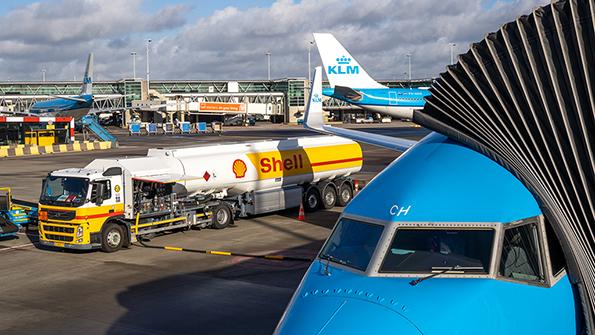
KLM Royal Dutch Airlines operated its first commercial passenger flight from Amsterdam Airport Schiphol to Madrid using an admixture of 500 liters of sustainable synthetic kerosene. Shell produced the synthetic kerosene at its research center in Amsterdam. It is produced using CO2, water and renewable energy from sun and wind from Dutch soil. The flight was made possible through a partnership with KLM, Shell and the Dutch ministry for infrastructure and water management.
The Netherlands wants to stimulate the development and application of sustainable aviation fuel (SAF)—biofuels and synthetic kerosene—so European airlines will be able to use them exclusively by 2050.
Japan Airlines (JAL), meanwhile, has operated its first commercial flight from Tokyo Haneda to Fukuoka airport using a blend of traditional jet kerosene and a SAF from cotton clothing produced in Japan.
Fifty local companies worked with JAL on the cotton clothing SAF development project, begun in 2018, collecting some 250,000 pieces of clothing. The Green Earth Institute Co. provided technical support and the Research Institute of Innovative Technology for the Earth developed the bioprocess technology.
Also on the SAF front, British Airways (BA) is investing in a plant that will be built in the US and should provide 7,500 metric tons a year of low-carbon jet fuel from late 2022.
BA joins Canadian energy company Suncor and Japanese trading house Mitsui in investing in LanzaJet, the SAF producer launched in May 2020 by carbon recycling company LanzaTech. All Nippon Airways (ANA) is also participating in LanzaJet, which will build a Freedom Pines Fuels facility in Soperton, Georgia, that will convert ethanol made from industrial waste gases and agricultural residues into SAF using LanzaJet’s alcohol-to-jet process.
Planned as a demonstration plant, Freedom Pines will produce 10 million gal. a year of SAF and renewable diesel. After the demonstration facility meets its technical and economic goals, LanzaJet’s backers plan to invest further to build additional commercial-scale plants.
In other sustainability developments, United Airlines completed an agreement to work with air mobility company Archer as part of the Chicago-based airline's broader effort to invest in emerging technologies that decarbonize air travel.
Archer’s electric-vertical-takeoff-and-landing (eVTOL) aircraft use electric motors and have the potential for future use as urban air taxis.
Under the terms of the agreement, United will contribute its expertise in airspace management to assist Archer with the development of battery-powered, short-haul aircraft. Once the aircraft are in operation and have met United’s operating and business requirements, United, together with US regional carrier Mesa Airlines, would acquire a fleet of up to 200 of the electric aircraft that would be operated by a partner to ferry passengers to hub airports in large urban areas.
—Helen Massy-Beresford and Graham Warwick contributed to this report.





